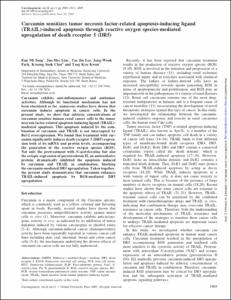Curcumin sensitizes tumor necrosis factor-related apoptosis-inducing ligand (TRAIL)-induced apoptosis through reactive oxygen species-mediated upregulation of death receptor 5 (DR5)
- Keimyung Author(s)
- Park, Jong Wook; Kwon, Taeg Kyu
- Department
- Dept. of Immunology (면역학)
- Journal Title
- Carcinogenesis
- Issued Date
- 2005
- Volume
- 26
- Issue
- 11
- Abstract
- Curcumin exhibits anti-inflammatory and antitumor activities. Although its functional mechanism has not been elucidated so far, numerous studies have shown that curcumin induces apoptosis in cancer cells. In the present study, we show that subtoxic concentrations of curcumin sensitize human renal cancer cells to the tumor necrosis factor-related apoptosis inducing ligand (TRAIL)-mediated apoptosis. This apoptosis induced by the combination of curcumin and TRAIL is not interrupted by Bcl-2 overexpression. We found that treatment with curcumin significantly induces death receptor 5 (DR5) expression both at its mRNA and protein levels, accompanying the generation of the reactive oxygen species (ROS). Not only the pretreatment with N-acetylcystine but also the ectopic expression of peroxiredoxin II, an antioxidative protein, dramatically inhibited the apoptosis induced by curcumin and TRAIL in combination, blocking the curcumin-mediated DR5 upregulation. Taken together, the present study demonstrates that curcumin enhances TRAIL-induced apoptosis by ROS-mediated DR5 upregulation.
- Publisher
- School of Medicine
- Citation
- Eun Mi Jung et al. (2005). Curcumin sensitizes tumor necrosis factor-related apoptosis-inducing ligand (TRAIL)-induced apoptosis through reactive oxygen species-mediated upregulation of death receptor 5 (DR5). Carcinogenesis, 26(11), 1905–1913. doi: 10.1093/carcin/bgi167
- Type
- Article
- ISSN
- 0143-3334
- Appears in Collections:
- 1. School of Medicine (의과대학) > Dept. of Immunology (면역학)
- 파일 목록
-
-
Download
 oak-aaa-00855.pdf
기타 데이터 / 486.06 kB / Adobe PDF
oak-aaa-00855.pdf
기타 데이터 / 486.06 kB / Adobe PDF
-
Items in Repository are protected by copyright, with all rights reserved, unless otherwise indicated.